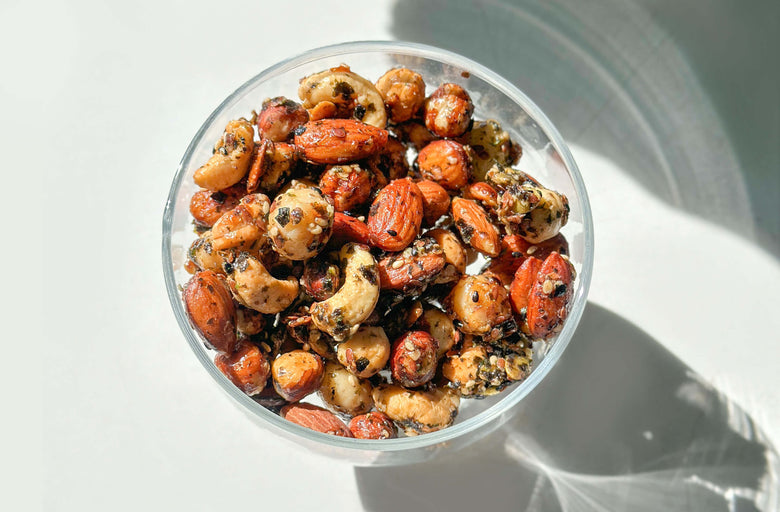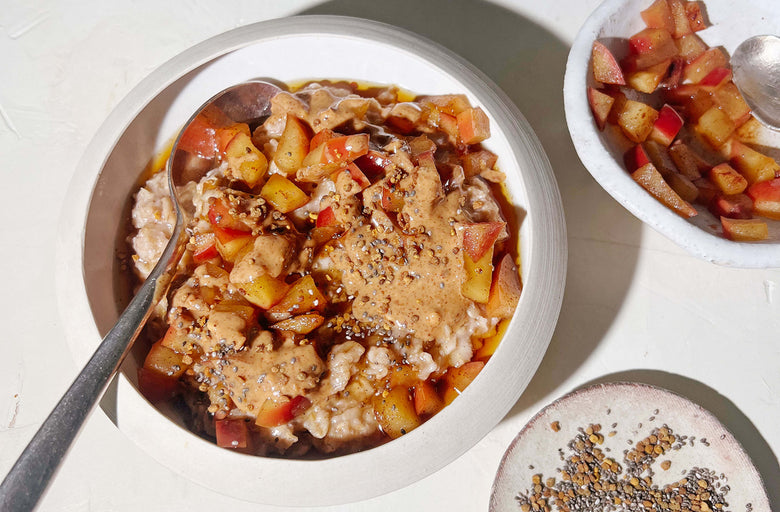Sakara Life, being grounded in science + guided by spirit, uses both Ayurvedic wisdom and cutting-edge medicine when designing meals for our clients. While we tap into the knowledge of Columbia-trained MDs and gut health experts, we also feel equipped with our own breadth of nutritional knowledge thanks to the Integrative Institute of Nutrition. Co-founder Danielle Duboise and our amazing team of wellness experts have undergone the transformative year-long program, and we thought it best to ask them some of your most burning Sakara FAQs...
Question: I am extremely active- will I get enough protein and feel satiated from the meals?
Sarah: We have several clients who are highly active (pro-athletes, marathoners, dancers, etc) who thrive on the Sakara program and feel satiated from the meals. All of the meals are 100% organic, gluten-free and plant-based and contain all of the nutrient-dense, superfood-rich ingredients that you need to fuel your body for optimal energy and performance. All of our meals are designed to deliver a target dose of plant-based protein that is bio-available and easily utilized by your body. By eating a variety of fruits, vegetables, grains, nuts, seeds and legumes, your body receives all of the essential amino acids it needs to form complete proteins. Plus, plant-based protein is more alkalizing than other sources of protein. This article does an excellent job of explaining the benefits of plant-based protein from a medical doctor's perspective.
That being said, the number one rule on our program is to listen to your body! Should you feel your body craving extra protein, please feel free to supplement. As long as you to stick to hormone-free, organic lean meats and wild-caught fish, you are still rocking the Sakara Life!
Question: I'm not losing any weight, and I'm following your program exactly - why is this?
Annie: Everybody is different and every body is different, so it takes some people a little longer than others to start seeing the changes. Usually, we recommend giving it at least 4 weeks to see (and feel!) real results. The Sakara Life program is designed to give your body the nutrients it needs to find its balancing point.
If you know that you are eating nutrient-dense meals but still not losing weight, look at how much you are eating. Consider halving your portion sizes and then rate your hunger. You can always eat the other half of your meal later or save it in the refrigerator for another day. I often eat half my lunch, stop when I'm satisfied, and eat the other half around 4pm when I'm hungry again. This kind of mindful eating can do wonders for your metabolism and digestion!
Are you snacking at all? We generally recommend not snacking in between meals so your body has time to rest and digest. That being said, our number one rule is to listen to your body. If you find that you have physical hunger between meals, honor that signal and choose a snack such as a low-glycemic piece of fruit, handful of nuts or seeds, or hummus + veggies.
Question: Why are there so many greens? What are the benefits?
Jennifer: Getting a minimum of 4 cups of greens into your body is part of the Sakara food philosophy and one of our main pillars; but our philosophy has science on our side. The six pounds of bacteria in your gut that dictate everything from your mood, your weight, hormone balance and energy levels, love to eat insoluble fiber that roughage and leafy greens are prime to provide. The fiber act as little scrub brushes in your GI tract to completely detoxify and flush out toxins (talk about a daily cleanse!).Plus, the chlorophyll is an incredible blood cleanser, bloat beater and crowds out parasites + yeast. Greens are essential to your overall health and do amazing things for your body: they help hydrate your cells which is key to staying young and glowing and provide your body with fiber, protein, and antioxidants.
Question: Why don't you count calories?
Nicolette: One of our missions at Sakara is to help people release the need to count calories, carbs, points and pounds and to start looking at food as nourishment, rather than a total caloric number. We want to help clients feel their absolute best, which is much more detailed and intricate than just counting calories. Additionally, most people are worried about eating too much food, when in reality, they likely aren't getting enough nutrients (by means of greens, hydrating fruits and vegetables, healthy fats, etc.). Stressing about how many calories you're consuming can actually result in your body holding onto excess weight, as elevated cortisol (the stress hormone) levels can increase weight gain. Not to mention, it's a lot of work to worry about that each and every day!
As we learn in IIN, bio-individuality is key to everyone's success - there isn't one style of eating that works for everyone (some people can tolerate gluten or dairy, others cannot), However, eating a mostly plant-based diet is one of the best things you can do for your microbiome and can change the way calories affect you as an individual. Some key reasons why we don’t want you to count calories are below:
- Calories are not a good indicator of the worth, nutrition, and vibrancy of a food - they’re a metric of energy, not nutrition. A rice cake has less calories than an avocado, but which do you think has more nutritional value?
- Calorie in does not equal calorie out. Most people count calories when looking to lose or maintain weight, but that is not a safe way to do either because the way you assimilate nutrients and absorb calories depends on the quality of the food, as well as the makeup of your microbiome (that 6 pounds of bacteria living in your gut!)
- Your microbiome is a huge determining factor for how many calories you will absorb from food. The best way to create a healthy and diverse microbiome is to eat a plant-based, whole-food diet with lots of leafy greens (hello, Sakara Life!).
- As mentioned, restricting calories is a stressor. When your body is stressed and believes it is starving, it wants to hold on to fat. By eating more of the right foods, you tell your body it’s okay to burn fat.
- When people restrict calories, nutrient-dense foods are often sacrificed. For example, our salad dressings have some of the highest nutrient content of any food - packed with healthy fats from nuts and high-quality cold-pressed oils. Because of this, they’re also high in calories, and misguided, calorie-fearing people may not want to eat them. However, without proper nutrients, your body won’t efficiently burn fat or build muscle. It’s food quality and composition that matter more than volume. Plus, you can healthfully eat a much larger portion of good-for-you grains and veggies, as opposed to a small portion of processed foods. I love to eat, so I know I'd much rather have a big, refreshing salad, than a tiny bag of chips that will be gone in two minutes!
- In order to cut calories, many people resort to things like 100 calorie snack packs, "diet" drinks, and fat-free yogurt. These foods might be lower in calories, but they aren't made with clean ingredients, have excess sugar to make up for flavor, and can cause you to crave more food. These can be extremely harmful on your body and microbiome.
It's important to listen to your body and find what works for you. By learning to let go of counting calories and focusing on getting enough nutrients and variety of whole foods in your diet, you will increase your body intelligence and begin to recognize what foods are healthy for you. Everyone is different, but tuning in to how much energy I have, how my skin is glowing, how many beautiful colors are on my plate, etc., sounds much easier (and more fun!), than keeping track of every bite of food I consume each day :)






